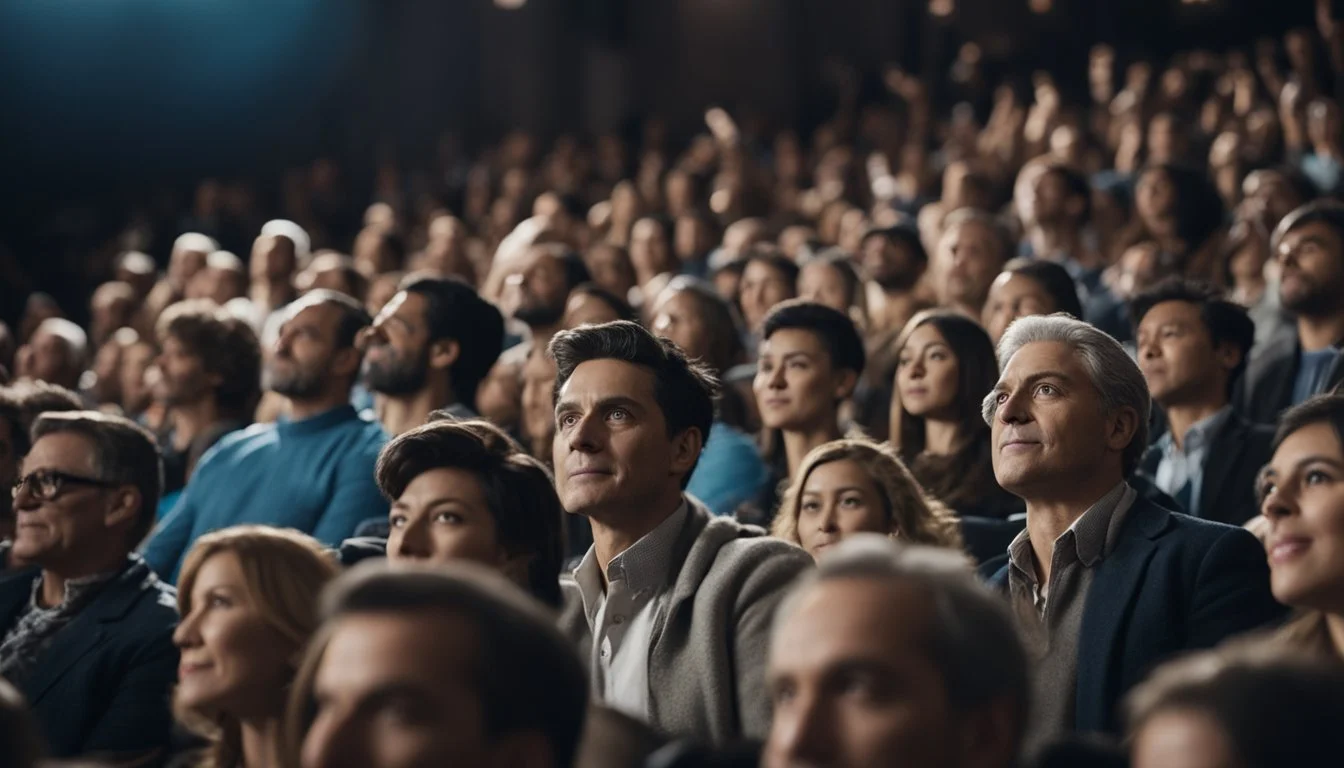Marina Zenovich: Profiling Controversial Figures with Nuance in Modern Documentaries
Marina Zenovich is a masterful documentarian known for her exceptional ability to profile controversial figures with nuance and sensitivity. Her work stands out for exploring the complexities of her subjects, from celebrated athletes like Lance Armstrong to formidable political figures like Jerry Brown. Zenovich’s films invite viewers to look beyond the headlines and examine the multifaceted nature of these individuals’ lives and legacies.
With a string of Emmy award-winning documentaries, Zenovich's storytelling prowess shines through in her thoughtful approach to difficult subjects. Her nuanced portrayals aim to engage viewers in a deeper reflection on the human aspects behind public controversies. Documentaries such as "Roman Polanski: Wanted and Desired" and "Robin Williams: Come Inside My Mind" exemplify her skill in crafting intimate and compelling narratives.
In "LANCE," part of ESPN's 30-for-30 series, Zenovich takes audiences through the turbulent career of cyclist Lance Armstrong, offering a balanced view that acknowledges his triumphs and controversies. This ability to create a comprehensive picture of complex figures is what makes Marina Zenovich's work uniquely powerful and compelling.
The Filmmaking Journey of Marina Zenovich
Marina Zenovich is an acclaimed documentary filmmaker known for her insightful portrayals of complex personalities and contentious issues. Her career spans from her early inspirations to her distinctive style and recurring themes.
Early Career and Inspirations
Marina Zenovich's journey into filmmaking began with a deep-seated love for compelling narratives. Inspired by the groundbreaking documentaries of the 1970s, she developed a keen eye for stories that examine the human condition.
Zenovich's academic background in film and broadcasting served as her foundation. Her early works often showcased her ability to uncover the layers of her subjects. She displayed an innate talent for melding factual content with personal storytelling.
Signature Style and Themes
Zenovich's films often focus on controversial public figures and their complex lives. She has directed documentaries on high-profile individuals such as Roman Polanski, Lance Armstrong, and Robin Williams.
Her signature style combines investigative journalism with empathetic storytelling. Key themes in her work include redemption, scandal, and the intricacies of fame. Zenovich’s films have a knack for humanizing her subjects, while still addressing their flaws and controversies head-on. This nuanced approach has earned her critical acclaim and industry recognition, including multiple Emmy awards.
Challenges of Profiling Controversial Figures
Profiling controversial figures presents numerous challenges, including ethical decisions, managing public perceptions, and understanding legal responsibilities. These aspects significantly impact the depth and integrity of documentary filmmaking.
Ethical Considerations
When profiling controversial individuals, ethical considerations are paramount. Filmmakers must balance truth-telling with respecting privacy.
For instance, Marina Zenovich has tackled subjects like Roman Polanski and the Duke University lacrosse team with sensitivity to the complex narratives. Ethical dilemmas often arise around what to include and omit to avoid sensationalism. Interview subjects must be selected carefully to provide a fair representation, and informed consent is essential.
Ethical storytelling demands transparency regarding sources and motivations, ensuring audiences can trust the filmmaker's integrity. Documentarians must also consider the potential impact on the subjects' lives.
Navigating Public Perception
Public perception can significantly influence both the documentary's reception and the filmmaker's approach. Marina Zenovich's works often scrutinize public figures who evoke strong opinions, like Lance Armstrong.
Documentarians need to manage bias, both their own and that of the audience. Balancing positive and negative aspects of a figure's life without alienating viewers requires a nuanced approach. The filmmaker must anticipate and address potential backlash, ensuring the portrayal aligns with factual accuracy and fairness.
Handling diverse audience reactions involves creating a narrative that fosters understanding rather than judgment, aiming to present a complete picture of the subject.
Legal Implications and Responsibilities
Legal implications are a critical concern in profiling controversial figures. Marina Zenovich's projects, including her "30 for 30" films, must adhere to stringent legal standards.
Intellectual property laws, defamation risks, and the need for accurate representation pose significant challenges. Clearances for archival footage, interviews, and music must be secured to avoid legal repercussions. Filmmakers need to work closely with legal advisors to navigate these complexities efficiently.
The legal stakes are high, potentially affecting the documentary's release and the filmmakers' careers. Accurate legal guidance ensures compliance with regulations, protecting both the filmmaker and the subjects from potential legal disputes.
Notable Works
Marina Zenovich has crafted a series of documentaries that navigate the complexities of controversial figures. Her films provide a balanced and deep exploration of their subjects, encouraging viewers to ponder the ambiguities of public and private personas.
Roman Polanski: Wanted and Desired
This documentary delves into the high-profile life and legal troubles of director Roman Polanski. Zenovich unravels the story behind Polanski’s 1977 statutory rape case, showcasing archival footage and interviews with key figures involved in the events.
Emphasizing both the legal intricacies and the media frenzy, the film received praise for its meticulous research and even-handed narrative. It's insightful in how it conveys the ambiguities surrounding Polanski's life and career.
Richard Pryor: Omit the Logic
This film examines the life of comedian Richard Pryor, highlighting his irreverent humor and tumultuous personal life. Zenovich captures the essence of Pryor's groundbreaking work and his influence on comedy, while also delving into his struggles with addiction and personal demons.
Through interviews and archival clips, the documentary portrays Pryor's raw comedic talent and the challenges he faced. Zenovich’s approach gives a nuanced view of Pryor's legacy, presenting both his genius and his flaws.
Lance Armstrong: Stop at Nothing
Zenovich's documentary on Lance Armstrong explores the rise and fall of the famous cyclist. Focusing on Armstrong’s doping scandal, Zenovich includes interviews with former teammates, journalists, and Armstrong himself.
The film provides a thorough scrutiny of Armstrong's career achievements and the subsequent unraveling of his reputation. By presenting varying perspectives, Zenovich allows viewers to grasp the complexity of Armstrong’s journey and the extent of the scandal that tainted his legacy.
Interviewing and Research Techniques
To capture the depth and complexity of her subjects, Marina Zenovich employs meticulous research and thoughtful interviewing techniques. These approaches enable her to present nuanced and authentic portrayals of controversial figures.
Building Trust with Subjects
Building trust with interviewees is crucial. Zenovich approaches interviews with a blend of preparedness and spontaneity.
She rigorously researches her subjects but remains flexible during interviews to keep the conversation natural. Listening attentively helps interviewees feel heard, encouraging them to share more.
Zenovich emphasizes the power of silence, allowing gaps in conversations that might prompt deeper reflections. She also makes sure to clarify points she doesn’t understand, which can open up richer dialogue. By being genuine and patient, she creates a space where her subjects feel comfortable revealing their true selves.
Investigative Research Strategies
Zenovich's investigative research is marked by thoroughness and precision.
She delves into every aspect of her subject's life, from public records to personal anecdotes. This comprehensive approach helps her build a rounded perspective. She consults various sources including news articles, books, and past interviews. This effort ensures she is well-prepared with contextual understanding, allowing her to ask insightful questions.
Making use of first-hand accounts and primary sources adds depth to her narratives. Zenovich’s ability to cross-reference information from disparate sources helps her create documentaries that are both accurate and engaging.
Use of Archival Footage
The use of archival footage is a hallmark of Zenovich's documentaries. It adds historical context and authenticity.
Zenovich meticulously selects archival materials that support her storytelling. This may include news broadcasts, old interviews, home videos, and even photographs. The archival footage serves to illustrate past events while also providing an emotional connection to the subject's history.
Integrating this footage seamlessly with new interviews and contemporary visuals requires a keen editorial eye. Zenovich ensures that the archival materials resonate with the current narrative, offering viewers a comprehensive and compelling view of her subjects.
Critical Reception and Impact
Marina Zenovich's films have attracted attention for their sensitive handling of complex subjects. This has earned her a loyal following among critics and audiences alike.
Critics' Reviews
Marina Zenovich's documentaries are often praised for their compelling storytelling and nuanced approach. Critics frequently highlight her ability to explore difficult, controversial subjects with a balanced perspective. Her film "LANCE" received positive reviews for its in-depth look at Lance Armstrong's life and career, blending archival footage and interviews into a cohesive narrative.
Awards and Recognitions
Zenovich's work has been recognized with several prestigious awards. She is a two-time Emmy Award winner, which underscores her excellence in documentary filmmaking. Her ESPN 30-for-30 films, such as the one on the Duke University lacrosse team, have been particularly noted for their detailed research and impactful storytelling.
Influence on Documentary Filmmaking
Marina Zenovich's influence extends to the broader documentary filmmaking community. Her use of interviews and archival footage has set a high standard for biographical and sports documentaries. By addressing controversial topics with care, she has paved the way for other filmmakers to tackle similarly challenging subjects without sensationalism. Her series "What Happens in Hollywood" further exhibits how she addresses complex themes thoughtfully, impacting the industry’s portrayal of intimate issues.
Developing a Nuanced Narrative
Marina Zenovich has a distinct filmmaking style that intricately balances facts and storytelling, addresses controversy and bias, and humanizes complex subjects.
Balancing Facts and Storytelling
Marina Zenovich excels at weaving factual details with compelling narratives. Research is foundational to her work, ensuring she presents accurate and verified information. Zenovich’s films, like the documentary on Lance Armstrong, exemplify this balance. She interlaces interviews, archival footage, and expert testimonies with skilled narrative storytelling, making her documentaries both informative and engaging.
Zenovich’s method ensures that viewers not only learn about the controversial figures she profiles but also remain captivated by the unfolding story. Her films serve as a prime example of how to maintain authenticity while crafting a gripping narrative.
Addressing Controversy and Bias
One of Zenovich’s strengths lies in her ability to address controversial topics head-on. She does not shy away from the darker or more contentious aspects of her subjects' lives. For instance, in her documentary "Roman Polanski: Wanted and Desired", she delves into the complexities surrounding Polanski’s legal battles.
Zenovich uses multiple viewpoints to provide a balanced perspective, often presenting both supporters and critics of her subjects. This approach allows her to minimize bias and ensure her films offer a fair representation of contentious issues.
Humanizing Subjects
Zenovich has a talent for humanizing her subjects, making even controversial figures relatable and understandable. Through detailed interviews and personal stories, she reveals the multifaceted personalities behind public personas.
For example, in her film "Robin Williams: Come Inside My Mind", Zenovich showcases Williams' vulnerabilities and personal struggles, painting a more complete picture of the beloved comedian. This humanization fosters empathy and deeper connection between the audience and the subject, allowing for a more nuanced appreciation of their life and actions.
The Audience's Role
The audience plays a critical function in how Marina Zenovich's documentaries resonate. The engagement of viewers and the influence on public opinion are pivotal to comprehending the broader impact of her work.
Viewer Engagement
Viewer engagement is essential for the success of any documentary. Marina Zenovich crafts her narratives to captivate and hold the audience’s attention. The emotionally compelling stories and well-researched content keep viewers invested.
The participation of the audience extends beyond just watching. Viewers often discuss and share insights on social media, contributing to a broader conversation. This interaction can amplify the reach of the documentary and extend its impact.
Additionally, feedback from the audience can shape future works of filmmakers like Zenovich. Understanding viewer perceptions and reactions enables filmmakers to refine their storytelling techniques.
Shaping Public Opinion
Documentaries have a profound influence on shaping public opinion. Zenovich’s films often tackle controversial subjects that prompt critical reflection and discussion. By presenting well-rounded portrayals of her subjects, she provides viewers with a deeper understanding of complex issues.
The audience’s perception of public figures featured in Zenovich’s work can shift based on the documentary’s narrative. This shift can influence societal views, politics, and culture.
Films such as "LANCE" not only inform but also challenge preconceptions. They spark debates that might lead to lasting changes in how these figures are perceived. The audience’s response can drive discourse in various media channels, further extending the documentary's impact.
Future Projects and Aspirations
Marina Zenovich continues to explore compelling stories through her documentary filmmaking. Known for her sensitive and insightful approach, she often selects subjects that spark discussions and challenge viewpoints.
Zenovich is currently developing several new projects. While details are often kept under wraps, she has expressed interest in examining the impacts of technological advancements on society. This aligns with her previous work's critical and thought-provoking nature.
She also aspires to branch out into narrative filmmaking. Experimenting with scripted features, she aims to bring her unique documentary style to fictional storytelling, creating a blend of reality and artistry.
The filmmaker’s commitment to storytelling is evident in her ongoing dedication to producing high-quality documentaries. As she looks towards future projects, Zenovich’s work will likely continue to provoke thought and inspire conversations across a wide audience.
The landscape of documentary filmmaking is constantly evolving. Zenovich’s aspirations highlight her adaptability and passion for addressing contemporary issues through film.







